|
|
|
Sort Order |
|
|
|
Items / Page
|
|
|
|
|
|
|
| Srl | Item |
| 1 |
ID:
167575
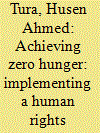

|
|
|
|
|
| Summary/Abstract |
A human rights approach to food security seeks to empower vulnerable groups to claim their rights. It also reinforces a government’s obligations to respect, protect and fulfil the right to food. Furthermore, it encourages the integration of the right to food into the design and implementation of food security policies. This article examines the human rights approach to food security, with specific reference to Ethiopia. It assesses the historical causes of Ethiopia’s food insecurity, and examines the legislative and policy measures that the country has adopted over the last three decades in order to achieve food security. Food insecurity in the country is largely explained by the absence of government accountability. In 1973 and 1984, the hunger caused by drought was transitioned to famine not because of overall unavailability of food in the country, but because the government failed to provide food aid to the starved people and concealed the occurrence of famines from the international donors. Despite designing some food security policies over the last three decades, the country has not yet adopted sufficient legislative and judicial measures to enforce the right to food. This article argues that Ethiopia should introduce a framework law on the right to food to end hunger in the context of achieving national food security.
|
|
|
|
|
|
|
|
|
|
|
|
|
|
|
|
| 2 |
ID:
167578
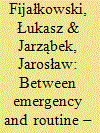

|
|
|
|
|
| Summary/Abstract |
The aim of this article is to explain the internal conditions of military security in a non-European context. It utilises securitisation as the theoretical perspective and investigates Iranian and Indonesian case studies to explore how the perception of internal threats and vulnerabilities determines the approaches to military security. It begins with a reiteration of securitisation theory assumptions, followed by clarifying the understanding of security in non-Western contexts. The case studies focus on the conditions which facilitate securitisation, including the nature of securitising actors, assumed concepts of security, and securitisation processes and their outcomes. The analysis indicates a necessity for several alterations in securitisation theory to realise its full potential. Civil–military relations in Asian states differ from those in the West, as both Iran and Indonesia show a high degree of military involvement in political affairs. Military security also becomes securitised as a result of internal political rivalries. The perception of threats is a tool in the struggle to extend the capabilities of security agencies or retain influences.
|
|
|
|
|
|
|
|
|
|
|
|
|
|
|
|
| 3 |
ID:
167577


|
|
|
|
|
| Summary/Abstract |
Each year over the last decade, there were on average 400 humanitarian disasters or emergencies, killing more than 100,000 people and affecting a further 200 million. Such humanitarian events require immediate responses as well as effective longer-term activities to aid communities recover. The global response is now valued over US$27 billion annually. More than half a million people are estimated to work in this sector, the majority being locally engaged staff. The international community provides significant resources to assist local communities impacted by these humanitarian emergencies. This aid flows through multiple channels, including national and regional governments, international non-governmental organisations and local community based organisations. Increasing the skills and knowledge of leaders and managers of these responses is a critical need to ensure the most effective recovery in communities as well as use of resources. Understanding the professional journey in the humanitarian sector is vital, but currently limited. As the humanitarian sector continues to expand, greater focus on the skill-set needed by humanitarian workers responding to these events is needed. However, tensions exist between the primacy given to the experiences and soft-skills of humanitarian workers over the value of academic qualifications. This paper provides some suggestions how this tension within the humanitarian sector may be addressed and reconciled. This paper presents new data based on interviews with 20 humanitarian professionals from a range of humanitarian aid agencies and considers their experiences and reflections on building a career within the humanitarian sector.
|
|
|
|
|
|
|
|
|
|
|
|
|
|
|
|
| 4 |
ID:
167574
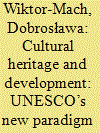

|
|
|
|
|
| Summary/Abstract |
In the 1980s, the process of convergence between culture and development began to emerge in the context of post-colonialism and changing geopolitical realities. Later on, along with increasing multilateralism, The United Nations Educational, Scientific and Cultural Organization (UNESCO) eventually became the main actor in promoting culture as a fourth pillar of sustainable development. The paradigm shift in the heritage-development agenda is examined in the context of growing aspirations of non-Western states to play an active role in the global heritage regime, and the interests and strategies of UNESCO’s secretariat and the member states. At first, heritage and development were perceived as separate or opposed fields. Recently, a sustainable development framework emerged as a new global development model. UNESCO has engaged in the shaping of the United Nations (UN) 2030 agenda, and advocated a pragmatic approach to heritage. This paper examines the evolution of ideas and concepts linking ‘development’ and ‘heritage’ forged at the forum of UNESCO as part of its Culture and Development framework. The role of the Global South in the paradigm change is highlighted.
|
|
|
|
|
|
|
|
|
|
|
|
|
|
|
|
| 5 |
ID:
167576
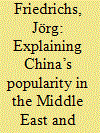

|
|
|
|
|
| Summary/Abstract |
China enjoys considerable popularity in the Middle East and Africa, not only among elites but also at street level. This article draws on international relations theories to explain this general pattern, as well as intra- and interregional variation. Every approach has something to contribute, but international political economy more so than realism. Constructivist theories are particularly useful in explaining China’s popularity in the Middle East and Africa.
|
|
|
|
|
|
|
|
|
|
|
|
|
|
|
|
| 6 |
ID:
167581
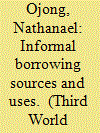

|
|
|
|
|
| Summary/Abstract |
This article seeks to analyse the informal borrowing sources of the poor as well as the purposes for borrowing. The obsession on characterising the poor as financially excluded fails to grasp their active financial lives. This article emphasises how relations of credit/debt are rooted in complex social and cultural forces. It is precisely because of the social embeddedness of credit that family finance, though interest-free, is not a first resort. Similarly, credit in kind from shopkeepers, though critical to consumption smoothing, is detested by some people. Also, it is argued that the involvement of the traditional leader in repayment enforcement in informal financial groups challenges the economistic narrative that attempts to separate credit from cultural norms.
|
|
|
|
|
|
|
|
|
|
|
|
|
|
|
|
| 7 |
ID:
167580
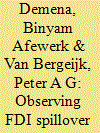

|
|
|
|
|
| Summary/Abstract |
We observe and analyse three intra-industry foreign direct investment (FDI) spillover transmission channels using unique firm-level data collected from on-site interviews and observations regarding domestic and foreign firms operating in Uganda in 2015. Our main results are: (1) the spillover effects mainly depend on the channel(s) by which they occur (the competition channel is most important while spillover benefits through the worker mobility and the imitation channels are less prevalent) and (2) both positive and negative spillover effects occur within the same channel and, moreover, effects differ by channel for the same case. These are novel and challenging findings that have not yet been recognised in theoretical and empirical research on FDI spillovers. Our results suggest that long-term pecuniary spillover effects are predominantly stimulated via the competition channel and show that only limited short-term and long-term technological spillover effects occur through the imitation and the movement of workers channels. These channels are not only less prevalent, but also appear to be constrained by competition-determined spillovers. We are confident that these directions for future research will have a high pay-off because, as shown by this exploratory fieldwork, a more complete picture of the spillover effects is reached when the channels are considered simultaneously.
|
|
|
|
|
|
|
|
|
|
|
|
|
|
|
|
| 8 |
ID:
167579
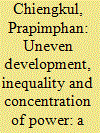

|
|
|
|
|
| Summary/Abstract |
This article provides a critique of the Thailand 4.0 strategy to push the country out of the middle-income trap through innovation-driven, inclusive and sustainable growth. First, it argues that the policies have insufficiently analysed the persistence of structural hierarchy and uneven development in the global political economy, which will constrain Thailand’s catch-up success in the future. Second, based on writings about progressive mission-led industrial strategies, it is argued that Thailand 4.0 ought to embed a progressive social and environmental agenda more clearly in its industrial strategy. Third, it is argued that Thailand 4.0 neglects to address the high concentration of political and economic power in the country, and also continues to allow unequal access to the policymaking process that has led to socio-environmental problems. Overall, this article argues that Thailand 4.0 will increasingly aggravate the two-tier fragmented nature of the political economic system of Thailand, where few can reap the biggest shares of the surplus and participate in more advanced sectors of the economy. It also calls for a more progressive industrial strategy and an alternative developmental path.
|
|
|
|
|
|
|
|
|
|
|
|
|
|
|
|
| 9 |
ID:
167582
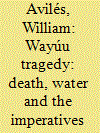

|
|
|
|
|
| Summary/Abstract |
Between 20007 and 2017 approximately 5000 children of the Wayúu tribe in the Guajira state in Colombia died, largely from an inability to gain access to clean water. A severe drought is a proximate factor to this massive loss of life, but the drought concealed a larger historical, political and economic context that was fundamental to this humanitarian crisis. A context dominated by the needs of our present epoch of global capitalism and not simply the consequences of regional corruption or the weakness of the Colombian state. In the case of Guajira, transnational coal mining interests have for decades worked to dispossess indigenous communities from their lands while capturing more of their water resources to facilitate the operation of the largest open-pit mine in the world. This demand for coal, land and water was facilitated by factions of Colombia’s political establishment on a national and regional level that viewed such investments as necessary for development and/or as a source of funding for corruption and political violence.
|
|
|
|
|
|
|
|
|
|
|
|
|
|
|
|
|
|
|
|
|